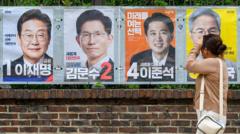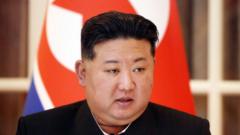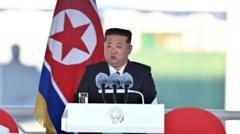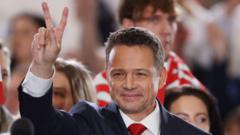On June 3, South Korea will hold a crucial presidential election to succeed Yoon Suk Yeol, who was removed from office after declaring martial law. Key issues to be addressed by the candidates include national security concerns, economic stability, and the country's declining birth rate amidst heightened political divisions.
South Korea Set for Presidential Elections Amid Political Turmoil

South Korea Set for Presidential Elections Amid Political Turmoil
Following the impeachment of Yoon Suk Yeol, South Korea prepares for a pivotal presidential election on June 3, with candidates addressing pressing political, economic, and demographic challenges.
South Korea is gearing up for a critical presidential election on June 3, tasked with choosing a successor to Yoon Suk Yeol, who was ousted from office after instating a controversial martial law for six hours in December. This unexpected political event plunged the nation into a phase of instability and showcased the deep fissures within its society.
The upcoming election arises from circumstances surrounding Yoon's impeachment, which was formally upheld by a constitutional court on April 4, thereby mandating a snap election within 60 days. Since Yoon's departure, the country has cycled through three acting presidents, with Lee Ju-ho currently holding the position as the labor minister.
The political landscape is charged with ongoing challenges that include managing relations with North Korea, a significant task for the new leader. Tensions have escalated in recent years due to North Korea's aggressive posturing, while domestic economic issues have worsened, particularly with tariffs imposed on South Korean goods by the United States under Donald Trump's administration. These combined pressures are expected to be pivotal discussions during the election campaign.
Polls indicate that Lee Jae-myung of the liberal Democratic Party is the frontrunner among six candidates vying for the presidency. Lee, a former human rights lawyer, is perceived as a champion of the working class, aiming to create a more equitable society. His main rival, Kim Moon-soo of the conservative People's Power Party, has promised to foster a business-friendly environment to stimulate job growth.
In addition to economic and security concerns, candidates will need to face the daunting issue of South Korea's declining birth rate—currently one of the lowest globally at 0.75. Addressing the demographic crisis is a focal point of the election, with experts highlighting its significance for the future workforce and economic sustainability.
Notably, this election marks a departure from past races as there are no female candidates, breaking a trend of having women in the presidential race over the last two decades.
Election day voting will commence from 06:00 local time until 20:00, with results anticipated shortly after the polls close, most likely revealing the new president by the early hours of June 4. The new leader will immediately assume office, facing the challenges left in the wake of Yoon's turbulent presidency, including ongoing legal troubles stemming from his martial law declaration.

















